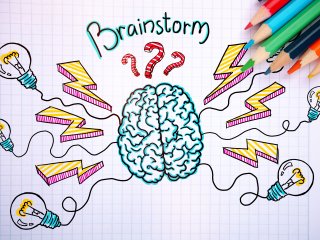Posted April 25th, 2018
By Kris Powers
Are you looking for a solution to a specific problem? Do you need to kick your creative side into gear? Brainstorming is an effective tool for situations where creative thinking and problem solving are required. Brainstorming can be done by an individual, or in a group, and both options have their benefits. The point of brainstorming, whether in a group or alone, is to get as many ideas out of your head in as little time possible. In the initial stages of brainstorming, you are technically “brain dumping”. You needn’t worry about linking like thoughts or having concern about redundancy of ideas or whether they are legitimate solutions. You will take the time to sort through the ideas and select which ones might be worth pursuing later.
In order to brainstorm as successfully as possible, it’s important to:
- Approach all ideas as viable ideas at the outset. Even if they seem ridiculous at first; great ideas can grow from bad ones. In the early states of brainstorming, all ideas are “good” and “equal”.
- Go for the easy, the tough and the slightly insane. When jotting down ideas; try to capture a few that are “easy” solutions, a few that are “tough” and a few that are downright “crazy”. By writing down some of each type of idea, your mind may come up with even more solutions. The exercise will train your brain to go beyond the "simple" ideas and explore more complex solutions. Who knows what you will come up with?
- Make a mind map. A mind map is a free-form way of organizing long lists of information and can be a fun and creative way to show relationships between thoughts and ideas. Simply put, a mind map is a diagram that literally “maps out” your ideas by connecting your thoughts to a central subject. One way to mind map is to start jotting notes on post-its. Put the post it on a board and build on your ideas, adding more post-its along the way. Eventually, you’ll want to step back and connect your ideas, looking for common themes or solutions.
- If you are more of a free-writer, give that a try. Let each idea flow and build on the other or branch out in a totally different direction altogether. Set a timer and free-write for 20 minutes. Sort through the results of your creative session and see if there are any possibilities for solving your issue. Just as with mind-mapping, you never know where it might lead you!
- Look at the situation you are solving for from a variety of perspectives. Put yourself in another party’s shoes; how would you answer this question, solve this issue if you were them? What would the ideal outcome be and how might you get there?
- Hit the web and use an online idea generator. Sites such as https://www.makeuseof.com/tag/idea-generator-brainstorming/ can assist you in coming up with ideas, and spark new ways of thought. Give online idea generators a try!
- Question everything. Ask questions of yourself, ask questions of others and keep asking more and more questions along the way. Questions lead us to really think through things that we may have not given enough attention to. Ask detailed questions and really listen to the answers you, or others, give in response.
- Walk away from the session for a bit. Get some fresh air, distract yourself from the issue at hand. Sleep on it. Giving your mind a break can provide the reset/refresh button when it’s most needed.
Once you've put all of your scattered thoughts and ideas down, you can begin to organize them and look for connections, common themes and possible solutions among your ideas. Sometimes, by simply allowing ourselves to do a free-thought "brain dump", we can generate some wonderful ideas - not only for the issue at hand, but for future growth opportunities. Even if you don't have a dilemma to solve, set aside some time to brainstorm on any area that interests you - personal growth, career goals, hopes and dreams for the future. Get creative and have fun with the brainstorming process! It really is a beautiful thing.
Looking to obtain training for a new career? Trying to figure out how to fit college courses into your busy schedule? Look no further! Ed4Career offers hundreds of courses in four distinct areas of online education: 1) Career Vocational Training (Not-for-credit), 2) Personal Enrichment, 3) For-Credit College Classes, and 4) Professional Development Training. Contact us today to learn how we can help you with your education and training needs. Problem solved!





